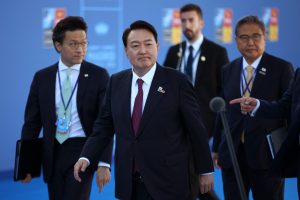The emergency martial law that South Korea’s President Yoon Suk Yeol announced late at night on December 3 shocked even seasoned Korea experts accustomed to the unpredictability of North Korean leader Kim Jong Un. In fact, North Korean media had been reporting on the possibility of Yoon declaring martial law, albeit indirectly.
The Rodong Sinmun, the official newspaper of the Workers’ Party of Korea, first touched on the possibility of martial law on August 20. While covering anti-Yoon gatherings across South Korea, the newspaper noted that there was a growing sentiment that Yoon was prepared to proclaim martial law. This echoed similar warnings that were being made by the Democratic Party (DP), South Korea’s largest opposition party.
Articles in North Korea continued to report on other voices in South Korea that were expressing similar sentiments: “Impeach Yoon Suk Yeol, the pro-Japanese traitor under wartime martial law!” “Yoon Suk Yeol has fallen into the worst political crisis of his term, and his exit strategy is war and martial law.” “Yoon Suk Yeol’s martial law conspiracy.” These pieces were merely covering trends in South Korea and were not accompanied by any North Korean commentary. As such, it is possible that the Kim administration did not believe that Yoon would truly impose martial law.
When Yoon went ahead and actually declared martial law, North Korea kept silent for more than a week. Then, on December 11, it reported on the developments. An article that day began: “The puppet Yoon Seok Yeol, who had already faced a serious crisis of governance and impeachment, declared martial law unexpectedly and unleashed the guns of the fascist dictatorship on the people.”
The following day, it was reported that “Calls for puppet Yoon Suk Yeol to be impeached are growing day after day amid intensifying political turmoil.” On December 14, South Korea’s National Assembly passed the second impeachment bill with 204 votes in favor and 85 against, suspending Yoon’s presidential authority. North Korean media also reported that gatherings to denounce Yoon were taking place across South Korea, the confrontation between the ruling and opposition parties was deepening as more members left the People Power Party, and “the puppet constitutional court will make the final decision on impeachment in the future.” In the 700-word article, the word “puppet” was used 19 times. Even so, “puppet” was the only word to reflect North Korean sentiment, with the article otherwise devoid of original commentary.
Given that North Korean media has been reporting daily on anti-Yoon movements by South Korean citizens, it could be said that the situation has calmed down significantly since the martial law commotion. Normally, Yoon would be severely denounced by Pyongyang for his outrageous actions. However, this could lead to support for conservative forces in South Korea if North Korea is perceived as trying to interfere in South Korea’s domestic affairs. Therefore, it is believed that North Korea is quietly looking at the situation at this stage while also limiting the amount of information that is disclosed to the public.
We cannot overlook the fact that a president of a 37-year-old democracy self-righteously declared martial law. While South Korea is still in turmoil, Yoon’s position of justifying martial law despite internal and international criticism is shocking.
On October 2, during an inspection of military special operations training, Kim criticized a speech that Yoon had given on Armed Forces Day the previous day, saying that “it was a great irony that caused the suspicion of being an abnormal man.” While Kim Yo Jong, vice department director of the Central Committee of the Workers’ Party of Korea (WPK) and Kim Jong Un’s sister, has become known for leveling criticism of this kind at Yoon, it is quite rare for the Supreme Leader himself to use such strong language. It is evidence of his disdain toward Yoon, although, in retrospect, it is hard to call Kim’s response extreme.
There is no doubt that Yoon fell into the echo chamber phenomenon. By communicating only with supporters, he incorrectly perceived his positions as being universally true and valid. Similarly, in North Korea, after Kim removed his uncle, Jang Song Thaek, who had been vice chairman of the National Defense Commission, 11 years ago, he was left with an inner circle of yes-men, which has led to increased rigidity within the North Korean regime.
Neighboring countries might think they should be grateful that Pyongyang has remained unusually calm in response to Yoon’s outrageous behavior. The upheaval in Seoul should serve as a mirror, one that reaffirms the importance of listening to diverse opinions and showing greater flexibility. That would provide the way forward for the long-term stability that Kim himself seeks.

































